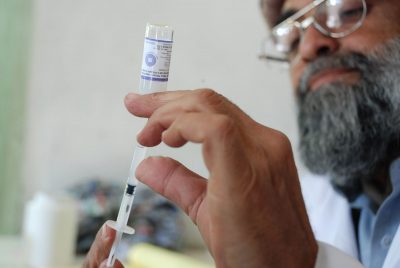
A Boston resident has been diagnosed with measles for the first time since 2013, the Boston Public Health Department reported Wednesday.
Shortly before the patient was diagnosed, the individual visited multiple businesses located throughout the South End, Fenway and Back Bay neighborhoods, possibly spreading the highly infectious but vaccine-preventable disease, according to a BPHC press release.
The locations visited Friday, Oct. 4 include:
- Render Coffee, 1:30 p.m. to 4:30 pm., (563 Columbus Ave.), South End
- Cafe Madeleine, 2:30 p.m. to 4:45pm (517 Columbus Ave.), South End
- Gyroscope, 6:30 p.m. to 9:30 p.m., (305 Huntington Ave.), Fenway
The locations visited Saturday, Oct. 5 include:
- CouCou, 11:30 a.m. to 1:35 p.m., (24 Union Park St.), South End
- Sir Speedy, 12:00 p.m. to 2:15 p.m., (827 Boylston St.), Back Bay
Anyone who visited these locations during the specified times may have came in contact with the disease, as the virus can remain in the environment for up to two hours after an infected person leaves, according to the press release.
The disease can be spread with or without direct contact from an infected person, according to the press release. The BPHC urges anyone who was in those locations and is unsure about their immunization status to get at least one dose of the Measles, Mumps and Rubella (MMR) vaccination immediately.
A BPHC spokesperson said unvaccinated individuals exposed to the measles virus may not get sick for up to 21 days after the exposure and urged all those who develop measles-like symptoms (which include fever, red eyes and a skin rash) to contact their medical provider immediately.
To protect oneself from contracting the disease, the spokesperson said vaccination is the only viable option.
“The best way to protect yourself from measles is to get vaccinated,” the spokesperson said. “If that is not an option, that person should have a conversation with their healthcare provider.”
One dose of the measles vaccine is 93 percent effective at preventing infection upon coming in contact with the virus, with two doses being 97 percent effective, according to the Center for Disease Control. The vast majority of Americans are vaccinated against the disease, meaning that the only populations at risk are those with low vaccination rates.
The only other way to develop immunity to measles was to have been infected by the disease in the past, according to the press release.
The spokesperson said the BPHC is working closely with the local healthcare community to spread awareness about the dangers of measles while also educating residents about the importance of being vaccinated.
“Education awareness initiatives include various social marketing campaigns, development of educational materials and direct training to groups including healthcare facilities, substance abuse programs, day care facilities, local businesses and other government agencies,” the spokesperson said.
Measles was declared eradicated in the United States by the CDC in 2000, according to the CDC website. However, the U.S. has seen multiple outbreaks in recent years, with 1,250 confirmed cases of measles in 2019 so far, the highest number of cases in nine years.
Joanne Schultz, 47, of Jamaica Plain, said she doesn’t understand why some people refuse to be vaccinated against measles.
“People think vaccines cause autism or other diseases and it’s not true,” Schultz said. “There’s science to back it up. But people still believe it and then they don’t get vaccinated, and it can hurt a lot more people.”
Willie Wang, 43, from Dorchester, said he is concerned about the uptick in measles cases in 2019.
“We have the vaccines now so nobody will get measles, but we have to keep it up. Otherwise it’ll just come back and that would be a disaster,” Wang said.
Walter Arnold, 55, of Roxbury, said he is worried that this case reflects a larger trend of people choosing to reject vaccines.
“Measles was a serious problem and we solved it with the vaccine,” Arnold said. “The vaccine is working, but there’s another case. It’s worrying to me. Especially if the number is growing, I really hope people get the vaccines so we can stop it.”


